|
WHEELING BREWERIES Wheeling has been home to more breweries than any other city in West Virginia, also holding the distinction of being one of America's major brewing centers during the 19th century. For more than one hundred years beginning in 1812, as least twenty brewing concerns operated there. By the end of the 1800s, there were six companies producing a total of about 300,000 barrels a year. Unfortunately, prohibition arrived early in West Virginia, going into effect in 1914, killing the Wheeling brewing industry for the next 80 years in the process. In the mid-1990s, the Nail City Brewing Company (brew pub) opened its doors in the city. A few years later it was sold and renamed River City Ale Works. In 2004, it changed ownership again and the brew house was shut down for good, leaving the restaurant portion to whither and die, which it did before [apparently] being sold yet again. Competition Keen in Golden Days of Brewing in Wheeling, West Virginia
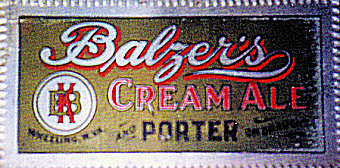 by Albert Doughty, Jr. by Albert Doughty, Jr.The following article originally appeared in the American Breweriana Journal, May - June 2004. This bi-monthly publication is included with membership in the American Breweriana Association (ABA). To visit their official website please click here: American Breweriana Association. It is with kind permission from the author, Albert Doughty, Jr. and The ABA, that we are able to present this article to you. A big thanks goes out to them! 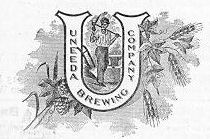 Six breweries operated in Wheeling at the turn of the century, only four were around when Prohibition arrived in 1914. An attempt to open a plant in Wheeling, once the brewing center of the region, failed in 1934 when the Benwood Brewing Co. shut its doors. It produced no beer. Here is a review of the breweries that made Wheeling the capital of brewing in West Virginia before Prohibition.
Eagle Brewing and Malt House 1863-1884
In 1863, John Reid, a liquor dealer, John Amick, a saloon owner, and John Kinghorn, a brewmaster, built an ale and malt house at 1425 South Street. By 1865, they were producing 150 barrels of ale a week. That same year, John Amick left the business, and the following year John Kinghorn died, leaving John Reid in full control of the business. By 1868, Reid had either sold or leased the brewery, but the locals continued to call it Reid's Malt House and Reid's Brewery well into the 1870s. The son of one of the founders, George Kinghorn, remained active during this time and, by 1871, he operated as a partnership with Killian Kress. American Breweries II lists the plant as the Killian Kress Eagle Brewery from 1878 to 1884. Under Kress, the Eagle Brewery produced 75 barrels of ale, bitter and porter a day. The cold storage cellars had a capacity of 7,000 barrels. The brewery's distribution was rather wide for the time, with products being sold in West Virginia, Ohio, Pennsylvania, and Maryland. The Malt House had a capacity of 30,000 bushels. In 1883, the Eagle Brewery produced 2,127 barrels of ale, bitter and porter. By the following year, the Eagle Brewery and Malt House closed its doors. Between 1884 and 1902, the plant was torn down and the West Virginia Steel Company was built on the site. Today, the original brewing site is part of the parking lot for the Wheeling Civic Center. Photo: Workers of the Eagle Brewery & Malt House stand in the windows and the front of the business in the 1880s.
Kenney Ale Brewery 1854-1900
In 1854 John Pfarr, a local carriage maker, built a brewery at 700 Market Street. Built into the side of a hill, the brewery was four stories high and 122 feet by 155 feet with cold storage cellars under the brewery. The first year, a modest 150 barrels was produced. In 1862, John Pfarr sold the brewery to Henry Daub, a former bottler of mineral water. By 1872 Daub found himself in serious financial trouble, so he leased the brewery to Frederick Bernhardt for two years. In 1874, Henry Daub's creditors sold the brewery to Kinghorn and Killian Kress. Both of these men were operating the Eagle Brewery at the time. It isn't clear if they moved production to the Eagle Brewery or continued to brew at the Market Street location. At some point between 1874 and 1884, John J. Kenney operated a bottling company at the brewery. In 1884 Kenney, along with a partner, Christian Blum, bought the brewery. The pair produced ale and porter. In 1889 Kenney became the sole owner of the brewery and removed Blum's name, making it simply the Kenney Ale Brewery. The brewery closed in 1900 and remained vacant until 1904, when it was sold to the Wheeling Decorating Company. This firm, which decorated china dishes, remained in the old facility until the 1960s. The property later housed the Hitt Heating Co. and R. E. Michaels Heating Co. In 1988 the Mountain Aire Heating and Air Conditioning Company bought the property and still operates there. Photo: The Kenney Ale Brewery as it stood in the early 2000s. Since then the front section has been torn down, but the back section remains standing today, and is still the home of Mountain Aire Heating & Air Conditioning Co. Market Street Brewery 1840-1902 In 1840, Franz Hegner had a brewery built at 840 Market Street, known as the Market Street Brewery. Hegner operated it until he sold out to Frank J. Rothacker in 1853. Rothacker owned an oyster house before going into the brewing business. After purchasing the brewery, he had three cold storage cellars cut out of solid rock at a cost of $22,000. The main cellar was 135 feet long. Rothacker produced 3,000 barrels of ale and lager annually. He also made malt for use in the brewery and for sale. In 1872, Rothacker sold the Market Street Brewery to J.P. Brockhardt and a partner, Charles Frank, and the plant took the name J. P. Brockhardt & Co. By 1875, Frank left the brewery and the name was changed to Brockhardt Bros. Brewery. The names of the brothers in the business are unknown. In 1877, George Kinghorn and Alfred E. Smith bought the brewery. Both men were well-known brewers. Kinghorn had been a partner in the Eagle Brewery and Smith operated his father's brewery, the G.W. Smith Brewery at 1700 Chapline Street from 1870-1877. Just two years after the purchase, Alfred Smith became the sole owner. Under Smith, most of their product was cream ale. In 1886 the plant produced 2,619 barrels of ale. In 1891, Alfred Smith, along with five others, incorporated as the Market Street Brewery with M.E. Lally as president. Smith became the plant's general manager. A bottling department was added in 1897. In 1902 the brewery shut its doors and was demolished before Prohibition.
Balzer Brewing Co. 1854-1914
Peter and Thomas Zimmer founded a brewery at 8th & Filbert Streets in 1854 (now McColloch & 39th Streets). The Zimmer brothers operated at that location until 1869. They built a new brewery on the top of Marshall Street (now 25th Street) in 1869, which was sold to Morris Balzer in 1875. Balzer, a native of Germany, had received his training at the G.W. Smith Brewery. Under Morris, the plant brewed ale, porter, and a product they called, Swankey (if anyone has information on this type of beer please contact the author). The brewery was built of brick and wood against a hillside with cold storage caves cut out of solid rock. After buying the brewery, Morris moved his family into a loft over a barn (probably the stables) while a new family home was constructed next to the brewery. In 1885, the brewery produced 1,139 barrels of ale and porter; lager was never produced. In 1887, Morris Balzer died and his son, Joseph, took over the brewery. He died the following year. 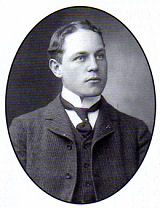 Another son, Henry, was only 13, so their mother, Katherine, took over brewing operations. She proved to be a good businesswoman but was also a tough boss. When workers appeared idle at the brewery, she didn't want them standing around, so she put them to work cleaning her house. In 1897, Henry Balzer took control of the brewery and about this time the name was changed to the K. Balzer Brewery, no doubt in honor of their mother. Between 1890 and 1902, a new boiler house and a keg washing house were constructed. A new bottling house was also added. A saloon inside the brewery was converted to office space sometime before 1902. Balzer's main brews were Balzer's Cream Ale and Balzer's Porter. The brewery was a small but successful operation until the Yost Law closed all breweries in the State in 1914. The status of the brewery during the dry years is not known, but in 1934 a club was started up in part of the old plant. In the 1940s or 50s, the Pittsburgh Brewing Co. tried to purchase the Balzer recipes, but Henry didn't like the deal. The remains of the brewery disappeared in 1979 to make way for new highway construction. Photos: Brewer-businesswoman Katherine Balzer (top left); Henry Balzer (right)
Schmulbach Brewing Co. 1882-1914
Fredrick Ziegler's small brewery started in 1855 at 33rd & Wetzel Streets and produced only 200 barrels a year until 1873, when a stock company, Nail City Brewing Company, took over the operation. One investor, Henry Schmulbach, then took control of the stock company and in 1882, put his name on the brewery. Refrigerating machinery was installed the following year and in 1899, a bottling plant was built. Production was up to 6,000 barrels of ale a year at the turn of the century. [production eventually reached 200,000 barrels! -ed.] It was one of four Wheeling breweries to close when Prohibition came in 1914.
Benwood Brewing Co. 1906-1912
The city of Benwood is located adjacent to Wheeling on the south. The Benwood Brewing Co. at 4842-4850 Water St. was incorporated on April 12, 1906. The founders were T.W. Keefer, Michael J. Agnic, Paul Rigot Sr., John Majisky and Gustaf Becke. It was, without a doubt, one of the shortest lived breweries in the area. Early newspaper accounts called it "well founded", but problems arose almost immediately, probably due to poor management. The company went into bankruptcy and placed in receivership where it had its greatest success. G.D. Ridenour was placed in charge of the plant during receivership, and immediately launched several innovative campaigns to promote the beer. Corks on the caps of their Cream Top brand were imprinted with letters. When the customer had enough caps to spell out the company name, they could redeem them for a $40 gift certificate at the brewery. The certificates were good at many stores in the Benwood-Wheeling area. Another gimmick used by Ridenour was to place $5 gold pieces in random bottles of Diamond Brew. the ideas were good, but not enough to save the brewery. 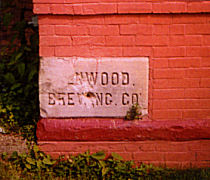 A second receiver, Charles J. Schuck, was appointed to replace Ridenour. On December 11, 1911, Schuck petitioned the court to sell the brewery and equipment free of any liens. This move was strongly opposed by many creditors. In early 1912, production ceased and the brewery had debts totaling $72,000. The debt included $25,000 in bonds, $12,000 acquired by the original owners, and another $25,000 debt added by the two receivers. The Benwood Brewery was sold at public auction on February 13, 1913. Valued at $150,000, it was bought by the Flaccus Preserving Company for just $19,000. The buyers planned to convert the plant into an auxiliary preserving plant, but this did not seem to happen. In the 1920s, the Terminal Cold Storage Co. used the brewery and in the 1930s, it was used as a grocery warehouse. It isn't clear when the brewery was demolished, but a trucking company was housed in parts of the old brewery until the 1970s. The remaining building is thought to have been the brew house, but since Sanborn Fire Insurance Maps do not exist, this is only speculation. Photos: What was probably the bottle house of the Benwood Brewery still stands today (left). Benwood's cornerstone is still visible (right)
Uneeda Brewing Co. 1903-1914
In 1901, the Uneeda Brewing Co. was incorporated with an authorized capital of $300,000. The founders were William L. Shempf, Joseph Korn, Andrew A. Schramm, Charles W. Conner, and William F. Bayha. The board of Directors was C. Frederick Biery, Philip Kochert, John Schell, Adam Koegler, and Edward Burkle. The original officers of the company were William L. Schempf - president, Philip Kochert - vice president, William Bayha - secretary, and Andrew A. Schramm - treasurer. A new brewery was constructed at the corner of 31st & Jacobs Streets at a cost of $170,000. The architectural firm of Mueller & Mildner, of Detroit, designed the brewery. Construction was handled by another Detroit company, Huettman & Creamer. Ground was broken in January 1902, but two weeks later construction halted when ground began to sink under the partially-laid foundation. Construction resumed after it was decided to go down 17 feet to bedrock to support the foundation. The brewery was completed in late 1902 or early the next year. The four-story brew house measured 140 feet by 110 feet, and had a 150-barrel brew kettle, mash tub with 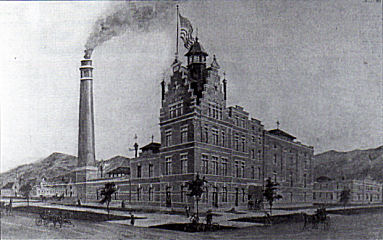 hydraulic mashing machine, hop jack, water tanks, meal hopper, rice tank, and beer cooler. The brewery had a capacity of 40,000 barrels a year. The mill house was four stories high, and was equipped with two steel malt bins and an iron malt mill. The office and bottling house was 40 feet by 100 feet, two stories high. hydraulic mashing machine, hop jack, water tanks, meal hopper, rice tank, and beer cooler. The brewery had a capacity of 40,000 barrels a year. The mill house was four stories high, and was equipped with two steel malt bins and an iron malt mill. The office and bottling house was 40 feet by 100 feet, two stories high.The office was finished in hardwood with both hardwood and tile floors. the bottling house had a capacity of 30 barrels a day. An ice house was located behind the brew house, and was equipped with two 35-ton Huettman & Creamer ice machines. The boiler house was located behind the ice house and was equipped with two 100-horsepower water tube boilers. Brewing began in early 1903. In 1911, new offices were erected with Andrew Schramm as president, Philip Kochert - vice president and general manager, and William Bayha - scretary-treasurer. Just 11 years after the gala grand opening, the brewery closed its doors as the result of the State's Prohibition law of 1914. 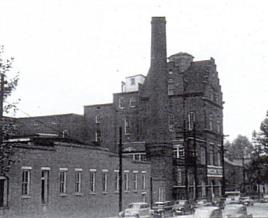 The brewery was converted into a match company with former Uneeda Brewing Co. officers heading up the new firm. By 1928, the plant was vacant. It was used by the Wheeling Tile Co. in the mid-1930s. In October 1975, the city condemned the former brewery. Benny Battistelli, former owner of the Wheeling Tile Co. and then current owner of the property, started demolition which was completed September 23, 1976. The brewery was converted into a match company with former Uneeda Brewing Co. officers heading up the new firm. By 1928, the plant was vacant. It was used by the Wheeling Tile Co. in the mid-1930s. In October 1975, the city condemned the former brewery. Benny Battistelli, former owner of the Wheeling Tile Co. and then current owner of the property, started demolition which was completed September 23, 1976.Photos: Andrew A. Schramm with his wife, Elizabeth. Andrew, born in Germany in 1863, was one of the founders, served as treasurer, and later president of Uneeda (top left) Architect's drawing of the Uneeda brewing Co. (right) The Uneeda property in the 1950s (bottom left). The author, Albert Doughty, Jr., ABA # 7696, welcomes letters from readers who share his interest in West Virginia breweries and breweriana.
You can reach him at:
415 N. Zane Hwy. Martins Ferry, OH 43936 email: belmontbry@comcast.net Credit for helping with this story goes to Ted Wolfe, Charles Brahler, Susan Appel, Bob Kay, Andrew Schramm, Ed Ehinni, Travis Zelk and Rob Musson. Competition keen in Golden Days of brewing in Wheeling, West Virginia © 2004 by Albert Doughty, Jr. © 2004 American Breweriana Journal |






























